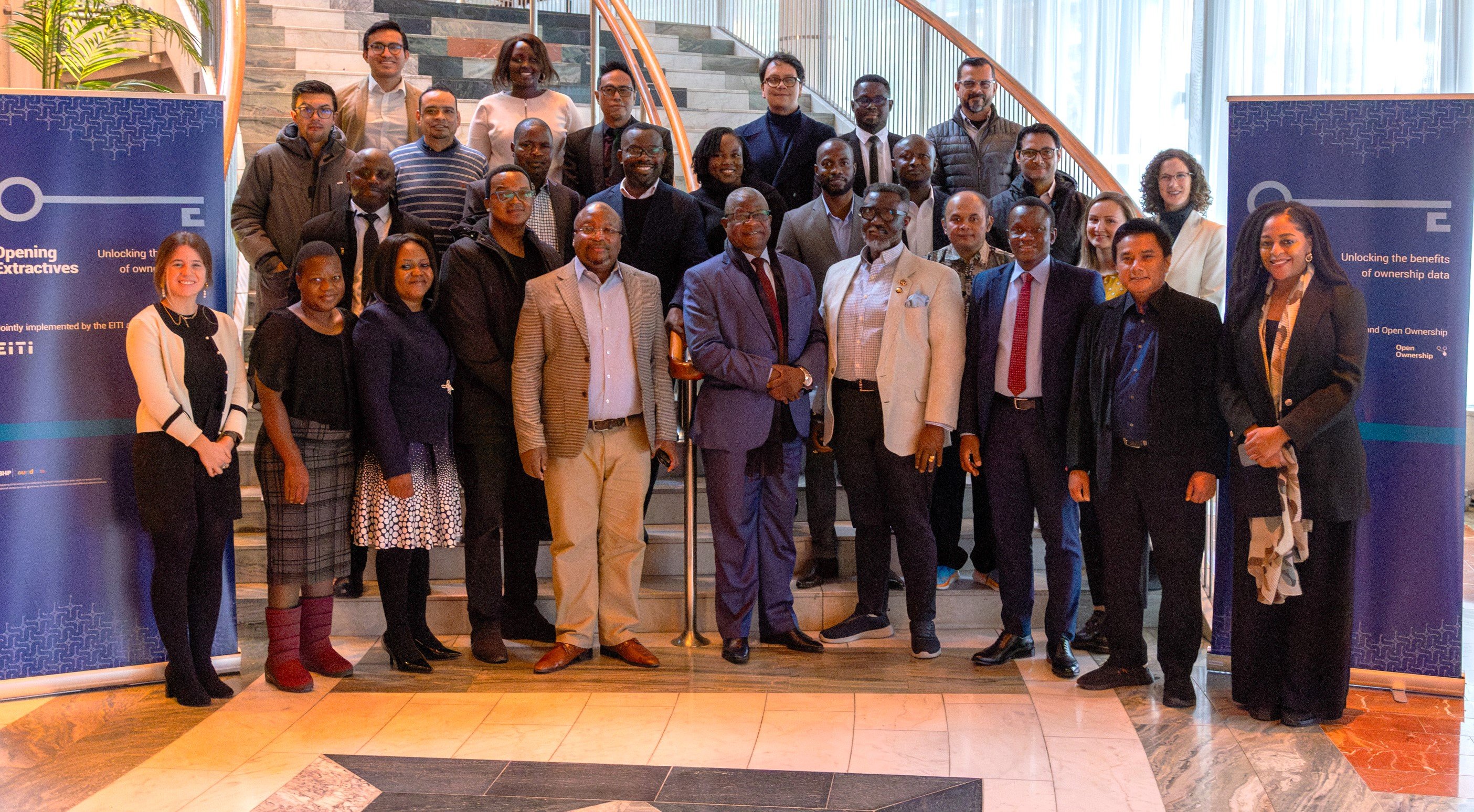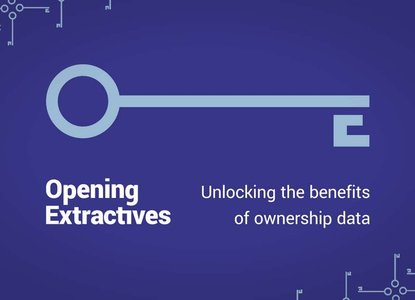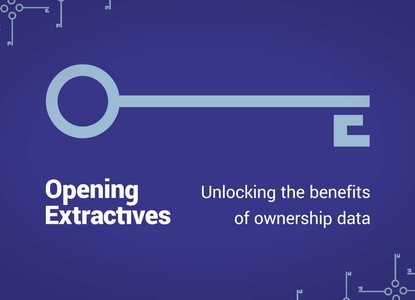Unlocking the potential of data on corporate ownership in resource-rich countries: Phase two of Opening Extractives

The recent Opening Extractives global peer exchange on embedding beneficial ownership in licensing screening gathered participants from mining, oil, and gas regulators and company registers from Colombia, Ghana, Indonesia, and Zambia.
What if citizens of resource-rich countries could enjoy the maximum benefit of their country’s wealth of natural resources? How can improving the availability and use of beneficial ownership (BO) data support this? For the last two and a half years, Open Ownership (OO) and the Extractive Industries Transparency Initiative (EITI) have been working together to advance this goal through the Opening Extractives (OE) programme.
As we head into the second half of our initial five-year programme, funded by the BHP Foundation, and we welcome on board USAID to co-finance the programme, we have taken stock of our impact and progress to date as well as the lessons learned so far, and laid out a refreshed set of goals that the programme will work towards over the next two years. These goals will help us achieve maximum impact.
An independent evaluation of the programme’s work so far gave us a rich set of data to work with – informed by interviews with stakeholders from 7 of the 11 countries currently participating in the OE programmes – from Argentina, to Mongolia, to Zambia.
Main findings of the evaluation
1. Opening Extractives has pushed BOT up national agendas
Many interviewees from multiple countries noted how the OE programme has placed beneficial ownership transparency (BOT) higher on the national agenda, as well as bringing together stakeholders from within and beyond the extractive sector that would not usually engage with each other. The combination of high-level political engagement, plus technical capacity building and peer exchange to increase stakeholders’ understanding of the key issues, are cited as important successes of the programme’s work so far. Stakeholders specifically noted the impact of bilateral and in-person peer exchanges.
2. Technical assistance is supporting countries to implement reforms and increase compliance with EITI requirements on BOT
The technical assistance provided to governments through the OE programme was also valued highly by interviewees across the board. This proved particularly successful in countries with specific goals targeting compliance with EITI’s Requirement 2.5 on beneficial ownership, which in the long run could complement national reforms on anti-corruption through robust data collection and verification mechanisms as well as data use.
3. Adaptation to context and change is essential to deliver impact
Like many multi-year programmes, the OE programme has faced challenges with ensuring continued impact at national level when governments change or key officials leave their jobs. The programme’s adaptive approach was recognised as key to ensuring resilience of previous efforts and supporting sustainable reforms.
4. Using BO data is a significant challenge as the quality of data is often low
Some interviewees explained how it is challenging to implement data-use interventions in contexts where the quality of published data is low. The evaluation suggests that one way to make improvements here is to focus on improving data quality and on building the capacity of key agencies to use BO data in countries where this issue is slowing progress.
Further details are available in the full evaluation document.
Looking ahead
As the OE programme plans the next phase of delivery – January 2024 to December 2025 – we are adapting our focus and delivery approaches to take on board these findings and ensure we continue to drive and maximise impact. In addition to the independent evaluation and our ongoing dialogue with stakeholders, we are adapting delivery to account for some significant changes that have taken place in the international context for our work since the programme started.
Positive changes include the strengthening of BOT requirements in the 2023 EITI Standard and updated company expectations, as well as the 2022 revisions to the Financial Action Task Force standards. At the same time, economic challenges and recovery from COVID-19 continue to impact several stakeholders with which we work, and delivery timelines and goals will continue to need flexibility.
Goals for phase two
In light of this analysis, we have set four overarching goals, which the OE programme will work towards during 2024 and 2025:
Goal 1: Improving the availability and quality of BO data for the extractive sector
We are targeting concrete and tangible improvements in the availability and use of BO data by the end of 2025. Leveraging country commitments to implement the EITI Requirements on BO disclosure, we will focus our efforts on increasing the availability of BO data in OE countries where data is currently unavailable but there is a realistic possibility to make it available by 2025. Where information is available but poor data quality or lack of public access are limiting use, we will focus on improving these factors where there is a realistic possibility to improve the situation by 2025.
Goal 2: Integrating the use of BO data in processes for the application, award, and holding of extractives
There are heightened governance risks associated with the energy transition. It is a priority to incorporate BO information into the licensing process of mining projects, especially those involving transition minerals, and OO and EITI will provide targeted and specific support to licensing agencies to close this known governance gap.
Goal 3: Shaping and informing national and international debate on governance risks in the energy transition
The OE programme will drive thought leadership and ensure BOT is prominently placed within this agenda at a national level. We will achieve this by sharing examples of BO data use relating to the energy transition, and by using evidence from the programme to broker debates, deepening understanding of the evolving risks and the potential for BOT to offer solutions. This goal, and national-level work in countries that are particularly strategic for the energy transition, is the key focus of USAID’s support for the OE programme.
Goal 4: Building knowledge and transferring capacity to national, regional, and local partners, institutions, and champions
This goal responds to both concrete needs from programme stakeholders as well as the need to ensure sustainability of the gains made under the programme once activities in any given country wind down. We will also have a strong focus on knowledge transfer to other EITI countries that are not participating in the OE programme, responding to the needs of EITI’s broader stakeholder base to learn from the programme to strengthen the implementation of Requirement 2.5 and maximise the benefits of BO disclosures for a wider scope of countries.
Conclusion
The OE programme – with its impact and track record to date, deep engagement of a wide range of key stakeholders, and real progress seen across country programmes – is in a strong position to keep delivering impactful work to help progress BOT adapted to the many contexts in which we operate. We look forward to continuing our collaboration with many important partners in all OE countries and beyond.
The OE programme is combining OO’s depth of technical expertise on BOT with EITI’s political reach, in-country networks and extractive sector expertise, and the leverage created through commitments in EITI countries to meet the EITI Standard. This is resulting in concrete impact – both nationally and internationally.
Heading into this next phase, we will continue to leverage the OE programme’s unique position and ability to drive and support concrete progress nationally, facilitate the participation of national reformers in international debate, and generate new evidence on frontier issues, such as the importance of BOT in the transition minerals sector as the energy transition advances.
Related articles and publications
Publication type
Blog post
Country focus
Senegal,
Argentina,
Philippines,
Liberia,
Ghana,
Mongolia,
Zambia
Topics
Opening Extractives

